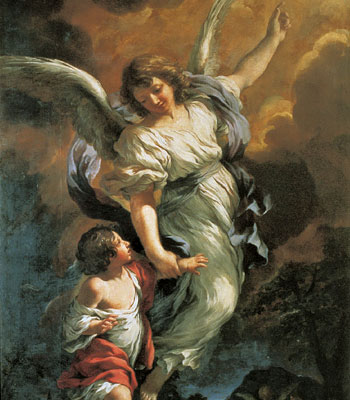
In addition to all the official teachings of the Church, which come from the Bible and Sacred Tradition, Catholics believe God can also grant private revelations to persons of His own choosing. The Church usually doesn’t pass judgment on the authenticity of such revelations and visions, but many times these messages—assuming they don’t contradict the official teaching of the Church—have great spiritual value. One alleged visionary of the second half of the 20th century was a Hungarian nun named Sister Natalia, who belonged to the Order of the Good Shepherd Sisters. Our Lord’s words in the Gospel about being able to stand secure before the Son of Man reminded me of Sister Natalia’s vision of what individual judgment is like at the moment of death.
According to Sister Natalia, when a person dies, Jesus awaits him in His Divine Majesty. The person is accompanied by his guardian angel on his right, and by Satan on his left. The Virgin Mary intercedes for the person, especially those who were devoted to her during their earthly lives, but then withdraws during the moment of judgment— though her grace continues to radiate on her servants. The judgment itself is done quickly and in silence; the person sees his entire life in an instant—through the eyes of Christ. Every sin, every good deed, every moral decision, every offer of divine grace accepted or rejected, is instantly recognized and reviewed, without any possibility of self- deception, denial, or excuse-making. Those persons who had rejected Christ feel no remorse for their sins; they freely and deliberately turn from Jesus and toward Satan, who instantly seizes them and drags them off to hell. Much happier is the fate of those who had lived lives of love and died in a state of perfect grace; they directly and joyfully enter into the glory and joy of heaven. (To digress for a moment: Other visionaries have suggested that this number is very small; of all the people around the world who die every day, supposedly no more than one in a thousand is able to enter heaven immediately.) Most of the time, according to Sister Natalia, Jesus points to the person’s place reserved in heaven, and then points to purgatory, saying, “Go in!” The person, fully aware of his faults and imperfections, eagerly enters purgatory, wanting more than anything to be cleansed and healed and made holy, so as to be worthy of entering Christ’s Kingdom—for Scripture tells us that nothing with even the slightest impurity or stain of sin may enter there. A person temporarily exiled to purgatory is escorted there by Mary and by his guardian angel, who strengthen and console him until the moment finally arrives for his victorious entry into heaven (The Victorious Queen of the World, p. 44).
Is this vision genuine? None of us will know for sure until the day of our own death, but certainly this description in no way contradicts what the Church believes and teaches. Each of us definitely will one day experience judgment; that’s why Jesus says “pray that you have the strength to escape the tribulations that are imminent and to stand before the Son of Man.” Our prayers, good works, acts of penance, and efforts to love and to forgive are very important, for these are all part of our faith—and it’s only our faith that allows us to approach Jesus with confidence.
Each year on the First Sunday of Advent, the Church draws our attention to the end of the world, thereby building on the themes of death and judgment covered during the month of November. These are never completely comfortable subjects, but the readings we’ve just heard reassure us by speaking of the promise of finding security in Christ. Jeremiah prophesied that God would raise up a just shoot, a descendant of David, who would bring about justice and peace. St. Paul says that through Christ’s grace, we can be “blameless in holiness before our God and Father at the coming of our Lord Jesus with all His holy ones.” In the Gospel Jesus describes His future coming, stating that there will be great fear and anguish—but those who trust in Him will be able to rejoice, for their salvation is at hand. The same principle applies whether we encounter Jesus at the end of the world or at the moment of our individual deaths: those who’ve lived as His followers have nothing to fear.
Today’s Scripture passages give us advice on how to be prepared for this coming moment of judgment and truth. Jesus says, “Beware that your hearts do not become drowsy from carousing and drunkenness and the anxieties of daily life” – in other words, we mustn’t let the temporary pleasures and concerns of life blind us to the need to continue growing spiritually. This is a real danger, and Christ presents it as such; we might be so busy living and enjoying ourselves that we’re caught unprepared for the moment of death and judgment. Many people seem to live this way. As followers of Christ, we know better—but we shouldn’t congratulate ourselves and become complacent. St. Paul says that even if we’re already living in a way pleasing to God, we should learn to make still greater progress. God gives us this Advent season not only as a time for sinners to repent, but also as a time for good Christians to become better Christians.
During these next few weeks of Advent, let’s try to pray a few minutes more each day, and to be just a little bit nicer to the people around us. Let’s help the members of our families a bit more than usual, and be just a little more willing to compromise when we have disagreements with others. Let’s try a little bit harder this year to celebrate the true meaning of Christmas, instead of getting swept away by society’s attempt to turn it into nothing more than a shopping extravaganza and mid-winter festival. All the values we now hold and the decisions we now make will either help us, or hinder us, on the day of judgment. This is our time and our opportunity to make ourselves ready. Let’s make the most of it; let’s use God’s grace, that we may indeed stand secure before our Lord and Savior Jesus Christ.








